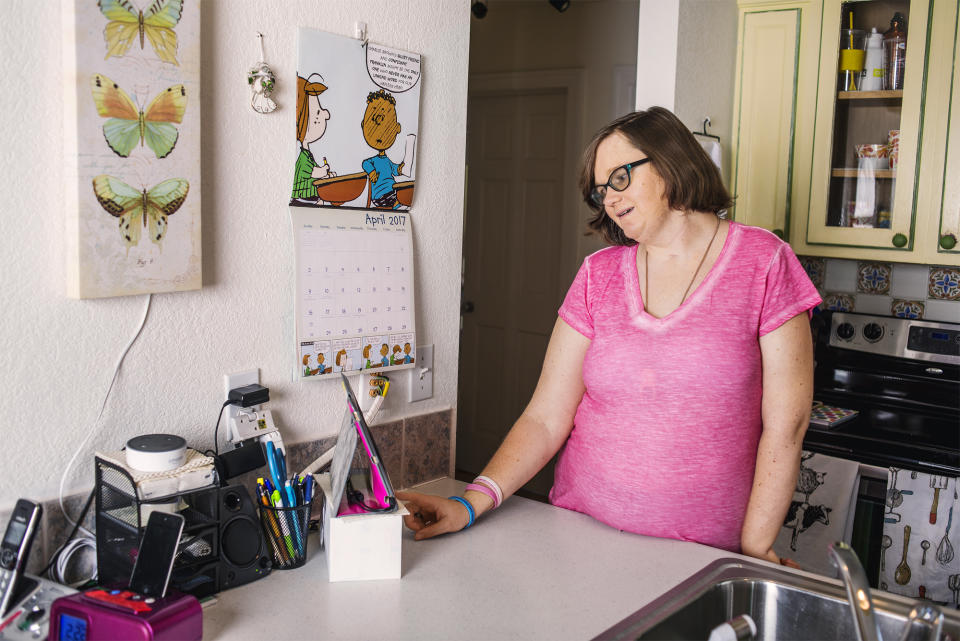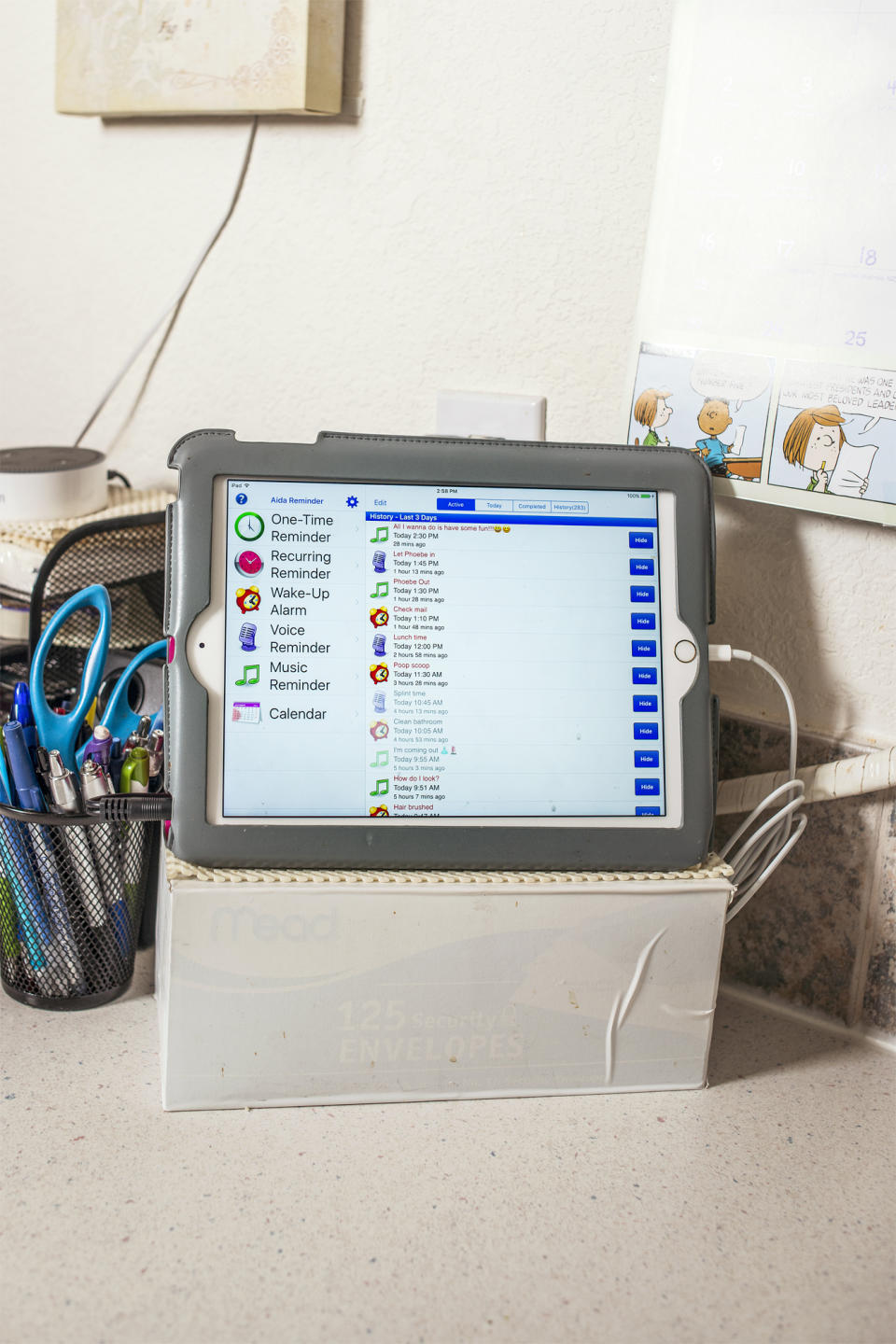How One Mother Discovered the App That Changed Her Disabled Daughter's Life

Nearly every morning, Alice Brouhard visits the yellow cottage in Glenwood Springs, CO, where her daughter, Kara, lives. As they chat over coffee, reminders sound frequently from a speaker on the counter. "Finish breakfast," it prompts. "Let Phoebe out." "Brush teeth."
Kara relies on these messages-about 85 of them, recorded in her own voice on an iPad app called Aida Reminder-to get through the day. As a result of a traumatic brain injury, Kara can't tell time, read or navigate daily tasks on her own. But Aida Reminder, along with other technology, has enabled Kara, 36, to accomplish far more than her doctors thought possible.
A New Normal
On a cold day in 1986, Alice and her husband, Jim, took Kara, their exuberant 5-year-old, skiing at a local resort. Kara fell in the snow, and before she could regain her footing, an out-of-control skier crashed into her, shattering her skull with the tip of one of his skis.
A medical helicopter arrived to transport Kara to the hospital, and in the following days and weeks, she had multiple brain surgeries. She remained in a coma for two months. One day, as Jim and Alice sat by her bedside, she opened her eyes. "Hi, Dad," she said, to her parents' relief. Yet big challenges lay ahead. Kara's left side was paralyzed, and she had suffered enough vision loss to be considered legally blind. Doctors told the Brouhards that Kara might not walk again or regain full speech.
Back at home, Kara relied on a feeding tube. Alice and Jim both worked as nurses, but they were unprepared for the emotional and psychological task of tending to their own daughter's precarious health. "Every day I'd think, Maybe tomorrow will be better," says Alice.

With tutoring from her kindergarten teacher and intense physical therapy, Kara returned to school the following September, walking and eating on her own and speaking well enough to convey her needs. An aide helped keep Kara on track, and teachers modified her curriculum. Alice made sure Kara was included in Girl Scouts, choir, class trips and other activities.
Because the part of Kara's brain responsible for initiating activity had been damaged, she required explicit and repeated prompts for everything from finishing meals to getting out of the shower after the hot water had run out. Alice set timers as reinforcement. "I couldn't remember what to do and what not to do," says Kara, who speaks with a flat affect.
Despite her challenges, Kara advocated for herself. In high school, Alice recalls, "she took such a dislike to the 'Special Needs' room label that she had it renamed the 'Abilities Room'-and even then, she didn't want to go in it." At school planning meetings, staffers would tell Alice to put Kara on the list for a state adult group home where she could live full-time. "Kara would speak up and say, 'I want my own life. I want my own house when I grow up,' " says Alice.
A Tech Solution
As Kara entered adulthood, she grew increasingly eager for independence, though she still had to rely heavily on her parents. "She hated being told what to do, even though she needed it," Alice says.
At a disability conference in 2005, Alice learned about a computer program offering spoken reminders. The software cost $6,000, but the relief of finding a tool that empowered Kara proved to be well worth it. About six months later, Alice and Jim came home to find that Kara-following a recipe from the program-had made dinner. "They were the best bean burritos we'd ever had," says Alice.
"I've realized that spreading the word about this technology is my mission," says Alice.
In 2006, Kara, then 26, moved into a place of her own, six blocks from her parents' house. "For months, when I'd leave after a visit, I'd think, Is she going to be OK?" says Alice. But Kara flourished. A state-funded aide came by during the day to assist with meal planning and grocery shopping; drive Kara to therapeutic horseback riding or her gig volunteering at an animal shelter; and help her shower.
One night in 2012, Alice Googled "best reminder apps" and found Aida Reminder, which costs only 99¢. It took only a minute to program a prompt on an iPad rather than the 5 minutes the clunky old program had required. Aida Reminder also enabled Kara to record herself. "It was better to hear my own voice than someone else's," she says. They could load songs, too; Alice had Jimmy Buffett's "Hey Good Lookin " go off before dinner.
A Big Victory
Alice found more apps to enrich and expand Kara's world, including a Smithsonian one for looking up anything from animals to old-time movie stars; art apps Kara could use to draw; and an app for Facebook so Kara could connect with friends. Alice shared her findings at local and regional brain-injury support groups; Kara demonstrated using Aida Reminder. "People told us we gave them such good ideas," says Alice. "Kara was so proud."

Several months after Kara started using Aida Reminder, Apple updated its operating system, and the app no longer worked automatically. For Kara to get a reminder, she'd have to go to her iPad, open the app and touch the prompt to hear it-which defeated the purpose.
Concerned, Alice called, emailed and wrote letters to Apple about the changes, but got no response. In 2014, the Brouhards and four other families in Colorado with disabled children launched Families at the Forefront of Technology (FFT), a grassroots group dedicated to finding technological resources for people with disabilities. That fall, they hosted a conference in Snowmass, CO. One attendee encouraged Alice to start a petition on change.org urging Apple to fix the Aida Reminder app. Alice called it "Kara's Own Voice," and signatures came in slowly but surely. Kara and Alice even picketed outside an Apple store in Denver.
Finally, in May 2015, Apple emailed Alice to request a phone call. More conversations followed. About a month later, Apple agreed to restore the voice reminder function. To Alice's and Kara's delight, when the app first worked again, they saw a special message: "Voice reminders are back!…(Thanks to Alice and Kara!)."
Today, the Aida Reminder app continues to be the soundtrack of Kara's life. On Tuesdays, her voice informs her, "It's Bible study day," and on Thursdays, "Get out the cookie cart" (where she keeps supplies for baking treats for local firefighters and police). The apps Kara uses, she says, "help me know what needs to be done. I don't have to rely on anyone else to succeed."
This month, Alice will preside over the third annual FFT conference. "I've realized that spreading the word about this technology is my mission," Alice says.

She's grateful, too, for the relief she's found from a worry that haunts parents of children with disabilities. "Because of technology, I know Kara can live the life she wants whether I'm here on this planet or not," she says. "That's the best feeling any parent can have."

You Might Also Like

